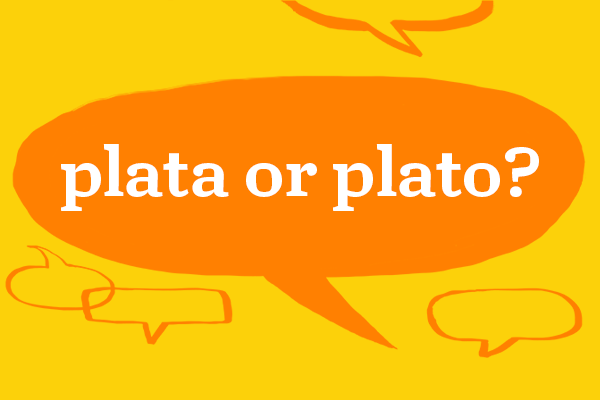Another week, another opportunity to buff up our knowledge of two similar-looking Spanish nouns with different meanings. This week it’s the turn of plata and plato.
Let’s start with plata (feminine). You can listen to its pronunciation here:
La plata is a shiny white metallic element much prized by jewellers and makers of expensive cutlery (though not necessarily appreciated quite so much by those who have to polish it). What is it? Why silver, of course, and by extension, things made of silver:
La importación del oro y la plata ha disminuido.
Imports of gold and silver have gone down.
Tengo que limpiar la plata.
I have to clean the silver(ware).
monedas de plata
silver coins
Este año celebran las bodas de plata (25 años).
This year they celebrate their silver wedding (25 years).
In Latin America especially, la plata is used informally to refer to money:
No tenía plata.
I had no money.
Let’s move on to plato, whose pronunciation you can listen to here:
Un plato (masculine) means a dish or plate, that flattish and, like its -o ending, often round piece of tableware you serve food on or eat off:
Llené un plato con fruta.
I filled a dish or plate with fruit.
El camarero retiró los platos.
The waiter took the dishes or plates away.
Detesto tener que lavar los platos con agua fría.
I hate having to wash the dishes in cold water.
Un plato is also a culinary creation or the food on someone’s plate – a dish or plate(ful):
Le preparas su plato preferido.
You prepare her favourite dish for her.
Mateo comió un gran plato de patatas.
Mateo ate a big dish or plate(ful) of potatoes.
Un plato is also a course – the combination of foodstuffs served at a particular stage of a meal:
De primer plato se servirá una ensalada.
For the first course, salad will be served.
Comenzó a comer el primer plato de la cena.
She set about eating the first course of the dinner.
Come back next week to dip into the meanings of another pair of nouns that look superficially similar.



